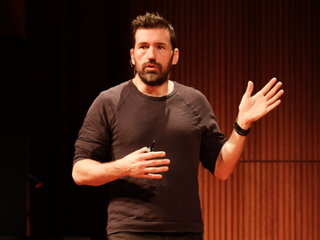Video: Christ Church's Bart Garrett on startup pitch decks
At Vator Splash LA 2015, Garrett's insightful talk on knowing ourselves
Read more...
At Vator Splash Health 2016, Ryan Howard, Chairman, Founder and former CEO of Practice Fusion, talked about 'Protecting yourself as the founder'.
Here are his top lessons on how to form the right board of directors for your company, with accompanying slides from his presentation.

"When you actually incorporate a company, one thing you can do and that I highly recommend is putting together three to four common board seats upfront. This is critical. Maintain control of your company as long as you can. At the board level is where it’s most critical. Many founders, including myself, actually lose control of their company after the Series A financing. When Practice Fusion closed its original Series A financing with Morgan Taylor, they took a seat, I had a seat, there’s a common seat as well. Sorry, an independent seat, and I no longer had control of the company very early. This is a really common mistake."

"For me, one of the things I think is really key is to always think about your downside. If this all ends today, not even if you’re fired, if the company goes out of business today, what do I have left, what do I have in my bank account? Can I get any liquidity from the equity? What’s really key here is that California is at-will so effectively, once you form your company, you start taking on investors and you no longer have control of the board. In the scenario that I just mentioned, I didn’t. You’re an at-will employee so if you don’t have the leverage on the board anymore, you can be basically let go for any reason. That’s just the reality of running a company. If the board and co-founders, they want you gone, they don’t have to give a reason to do so."

"The single biggest mistake that I believe founders make is assembling their board. This happens a lot. I mentioned the three to four common seats upfront to protect your interests. It will balance out bad board members as well. If you get a bad board member, and you have some common seats filled, it will turn the noise down on that. Again, I lost control of the board on Practice Fusion. I didn’t have any leverage after the Series A which is a profoundly large mistake on my behalf."

"Investor board members, deconstructing this really quickly, over time, the majority of your board members will likely be investors so if you’re doing an A though D series of financings, you’re going to take on likely four investors as board members. Upfront, what I notice is that we would pitch big funds so we’d go to Sequioa and it would just be in and out. They’d ask us a hundred questions and we’d have three meetings. If we’re lucky, we’ll get a term sheet. Upfront, during the second meeting, you want to go, 'Who in this room is actually likely going to come on our board?' to get that context so you can start building a relationship with them early on."

"I highly recommend avoiding bloated boards that can run your company. The larger the board, the more overhead you’re going to have and you’re going to feel that directly because you’re the only person in that organization that actually reports to them. This can be quite painful especially with junior board members. They’ll ask a lot of questions. If they don’t have a lot of companies in their portfolios, they can actually churn up a lot of your bandwidth. Also, I see this all the time, I lightly helped a person in a health care company in the city, she has a seed stage company with five people on her board. It makes absolutely no sense to me why she wo uld want four other bosses, why she’d want this overhead."
At Vator Splash LA 2015, Garrett's insightful talk on knowing ourselves
Read more...'Timing, Team, Idea, Business model, Funding," says Bill Gross, Idealab founder, at Vator Splash LA
Read more...At Vator Splash LA, Founder of Idealab shares lessons about scaling
Read more...Startup/Business
Joined Vator on
Practice Fusion provides a free, web-based EMR system to physicians. With medical charting, scheduling, e-prescribing (eRx), lab integrations, referral letters, Meaningful Use certification, unlimited support and a Personal Health Record for patients, Practice Fusion's EMR the complex needs of today's healthcare providers and disrupts the health IT status quo. Practice Fusion is the fastest growing Electronic Medical Record community in the country with more than 150,000 users serving 40 million patients. The company closed a $23 million Series B round of financing led by Founders Fund in 2011. For more information about Practice Fusion, please visit www.practicefusion.com

Joined Vator on
Ryan is the founder, chairman and CEO of Practice Fusion. He founded the company in 2005 and has grown it into the largest physician-patient community in the US.



